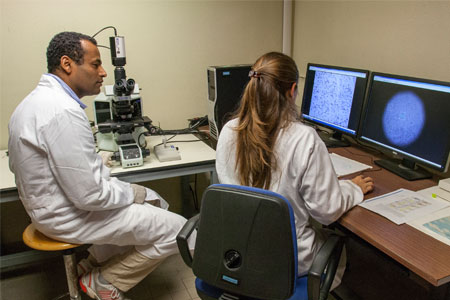Research strategies
The Department promotes and coordinates basic and applied academic research in the scientific disciplinary sectors BIO/14 (Pharmacology) and BIO/19 (General Microbiology) in the CUN 05/Biological Sciences area and MED/01 (Medical Statistics), MED/08 (Pathological Anatomy), MED/17 (Infectious Diseases), MED/36 (Radiology), MED/42 (Hygiene), MED/43 (Legal Medicine), MED/44 (Occupational Medicine) and MED/45 (Nursing) in the CUN 06/Medical Sciences area.
Research activities
The Department’s research activities include the following themes:
- Strict, highly standardised, multidisciplinary research to assess the main causes of human diseases and to identify feasible, effective preventive strategies
- Observational and experimental studies to evaluate the efficacy and appropriateness of different health interventions
- Development of models to evaluate the effects of interaction between environmental and genetic factors in the incidence and prevalence of diseases
- Pharmacoepidemiology and pharmacovigilance, especially in evaluating the risks of vaccines and other drugs
- Mechanisms of drug action at cellular and molecular level, in particular the interactions and biological properties of receptors and ion channels
- Drugs and mechanisms of the central nervous system, especially the study of cellular neural adaptation (stem cells) and behaviour in neuropsychiatric diseases (mainly drug dependencies) and physical exercise
- Definition of the reference values of xenobiotics and/or their metabolites in biological fluids and tissues
- Prevalence of diseases in occupational medicine
- Peculiar characteristics in the composition, structure and physiology of bacteria, mycetes, protozoa and viruses in relation to the beginning and evolution of infectious diseases, the action of antimicrobial drugs, prevention of infectious diseases and microbiological diagnosis
- Various areas of diagnostic and interventional radiology
- Causes, epidemiology and therapeutic and preventive strategies of the main infectious diseases, especially HIV and tropical diseases
- Molecular and tissue biology research to develop markers to diagnose different diseases, mainly in oncology
- Molecular biology studies in crime science (DNA polymorphisms, gonosomal and autosomal genetics of intragenic regions)
- Clinical risk management: analysis of medication errors leading to criminal and civil responsibility, to identify common methods of analysis and adopt preventive measures








